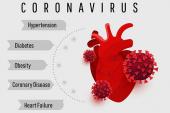Cardiometabolic Diseases Contribute to Bulk of COVID-19 Hospitalizations
The study is a “wake-up call” that improving metabolic health may prevent severe disease in this pandemic and others to come.

The overall number of COVID-19 hospitalizations in the United States wouldn’t have been so high if the burden of various cardiometabolic diseases in the general populations were lower, researchers suggest.
They estimate that 63% of hospitalizations through the middle of November 2020 were attributable to four conditions: obesity, hypertension, diabetes, and heart failure.
In absolute terms, that’s 575,419 hospital stays that “may have been prevented, due to less-severe illness, if we had a metabolically healthy population,” senior author Dariush Mozaffarian, MD, DrPH (Tufts University, Boston, MA), told TCTMD via email.
Lead author Meghan O’Hearn, MS (Tufts University), added that the study, published in the March 1, 2021, issue of the Journal of the American Heart Association, “is a wake-up call to improve our metabolic health through improvements to diet and physical activity, both for this pandemic and the future ones certain to come.”
‘Striking’ Findings
After SARS-CoV-2 started spreading across the globe, studies began to show that patients with cardiometabolic conditions were over-represented among patients with severe COVID-19, including those who were hospitalized and who died. Particularly in the United States, where nearly half of adults are diabetic or prediabetic or have hypertension and almost three-quarters are overweight or obese, cardiometabolic conditions “could be contributing to a substantial proportion of COVID-19 hospitalizations . . . as well as to associated health disparities,” O’Hearn et al write in their paper.
They used a variety of sources to explore that issue, including nationally representative data on the prevalence of cardiometabolic conditions from the National Health and Nutrition Examination Survey spanning 2015 to 2018; information on COVID-19 hospitalizations from the US Centers for Disease Control and Prevention (CDC) and the COVID Tracking Project; and a large multivariable analysis conducted in New York City to assess the relationships between cardiometabolic diseases and COVID-19 hospitalization risks.
For the purposes of the analysis, the researchers estimated that 41.4% of people were obese, 32.6% had hypertension, 14.2% had diabetes, and 2.4% had heart failure. Roughly one-quarter (26.9%) had at least two risk factors, 9.1% three risk factors, and 2.1% four risk factors.
There were an estimated 906,849 COVID-19 hospitalizations among US adults through November 18, 2020, and most were attributable to at least one cardiometabolic condition:
- 32.8% to obesity
- 26.2% to hypertension
- 20.5% to diabetes
- 11.7% to heart failure
“The sheer magnitude of the burdens of COVID-19 hospitalizations attributable to poor metabolic health (nearly two-thirds of all hospitalizations) was striking,” O’Hearn said. “We estimated that just a 10% reduction in the prevalence of obesity, hypertension, diabetes, and heart failure among US adults today could potentially prevent 11% of COVID-19 hospitalizations.”
Reducing Pandemic Risks
There were only modest differences in the patterns by sex, but the estimated proportion of hospitalizations attributed to any of the conditions tended to increase with age, except in the case of obesity. The proportion of admissions blamed on severe obesity was higher in the youngest age groups. Obesity was the most-important cardiometabolic risk factor across ages, followed by hypertension.
At any age, the proportion of hospitalizations linked to each condition was higher in Black versus white adults. Considering all four diseases together, the population attributable fraction was highest in Black individuals, followed by those who were Hispanic, white, and Asian/other.
“Disparities in metabolic health also partly explain more severe COVID-19 outcomes seen among Black and Hispanic Americans,” Mozaffarian said.
An important public health message about reducing risk during the pandemic can be taken from these results, he indicated. “Our findings highlight the urgent need for government officials, as they are emphasizing wearing masks, handwashing, and social distancing every day (all important measures), to also highlight every day to the public the importance of eating a little better, moving a little more,” he said. “Even small changes can make a difference.”
The investigators acknowledge that this type of study cannot establish causal relationships, but they note the consistency of prior research regarding the link between cardiometabolic health and COVID-19 severity, as well as biological plausibility, to support the robustness of their results.
“This research further highlights the societal burdens of cardiometabolic diseases,” they say. “The strong links between these conditions and poor outcomes in COVID-19 provide a compelling signal to clinicians and policy makers on additional approaches to improve population resilience for COVID-19 as well as future pandemics.”
As the world starts to lift pandemic-related restrictions, O’Hearn et al add, patients with cardiometabolic conditions should be a focus of continuing efforts to minimize severe infections and keep people out of hospitals, including vaccination programs.
Todd Neale is the Associate News Editor for TCTMD and a Senior Medical Journalist. He got his start in journalism at …
Read Full BioSources
O’Hearn M, Liu J, Cudhea F, et al. Coronavirus disease 2019 hospitalizations attributable to cardiometabolic conditions in the United States: a comparative risk assessment analysis. J Am Heart Assoc. 2021;10:e019259.
Disclosures
- This research was supported by the US National Institutes of Health (NIH) and the National Heart, Lung, and Blood Institute.
- Mozaffarian reports receiving grants from the NIH during the conduct of the study; receiving research funding from the Gates Foundation and the Rockefeller Foundation; receiving personal fees from The Global Organization for EPA & DHA omega 3s (GOED), Barilla, Bunge, Indigo Agriculture, Motif FoodWorks, Amarin, Cleveland Clinic Foundation, America’s Test Kitchen, Acasti Pharma, and Danone; participating on scientific advisory boards of start-up companies focused on innovations for health, including Brightseed, Calibrate, DayTwo, Elysium Health, Filtricine, Foodome, HumanCo, and Tiny Organics; and receiving chapter royalties from UpToDate.
- O’Hearn reports no relevant conflicts of interest.





Comments